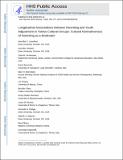Longitudinal associations between parenting and youth adjustment in twelve cultural groups: Cultural normativeness of parenting as a moderator.

View/
Publication Date
2018-02Author
Jennifer E Lansford, Jennifer Godwin, Suha M Al-Hassan, Dario Bacchini, Marc H Bornstein, Lei Chang, Bin-Bin Chen, Kirby Deater-Deckard, Laura Di Giunta, Kenneth A Dodge, Patrick S Malone, Paul Oburu, Concetta Pastorelli, Ann T Skinner, Emma Sorbring, Laurence Steinberg, Sombat Tapanya, Liane Peña Alampay, Liliana Maria Uribe Tirado, Arnaldo Zelli
Metadata
Show full item recordAbstract/
To examine whether the cultural normativeness of parents’ beliefs and behaviors moderates the
links between those beliefs and behaviors and youths’ adjustment, mothers, fathers, and children
(N = 1,298 families) from 12 cultural groups in nine countries (China, Colombia, Italy, Jordan,
Kenya, Philippines, Sweden, Thailand, and the United States) were interviewed when children
were, on average, 10 years old and again when children were 12 years old. Multilevel models
examined five aspects of parenting (expectations regarding family obligations, monitoring,
psychological control, behavioral control, warmth/affection) in relation to five aspects of youth
adjustment (social competence, prosocial behavior, academic achievement, externalizing behavior,
internalizing behavior). Interactions between family-level and culture-level predictors were tested
to examine whether cultural normativeness of parenting behaviors moderated the link between
those behaviors and children’s adjustment. More evidence was found for within- than betweenculture differences in parenting predictors of youth adjustment. In seven of the eight instances in
which cultural normativeness was found to moderate the link between parenting and youth
adjustment, the link between a particular parenting behavior and youth adjustment was magnified
in cultural contexts in which the parenting behavior was more normative
Collections
- Department of Psychology [216]
